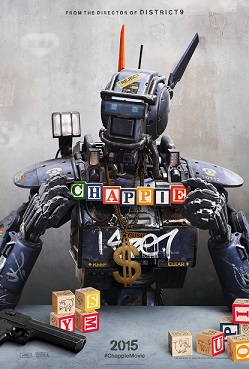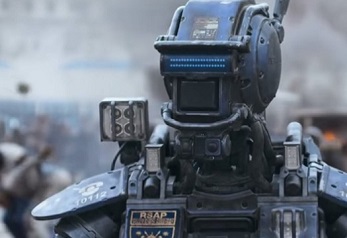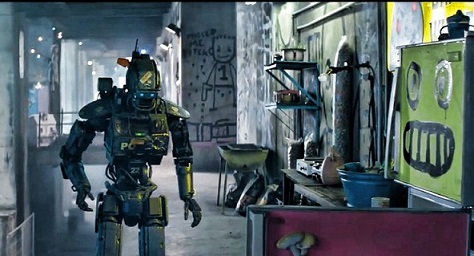In the near future, Johannesburg, South Africa has become the first city to have a largely mechanized police force. The force’s tactical automatons, called “scouts,” act as the proverbial tip of the spear during violent encounters, and are manufactured by the weapons contractor Tetravaal. There programmer Deon (Dev Patel) had been working to invent true artificial intelligence that can think and feel for itself, but the company doesn’t want robots it can’t control. As a result, Deon steals a scrapped scout and implants the program that grants it life. Circumstances worsen when this new life, named “Chappie,” is confiscated by thugs to help them commit crimes. Back at Tetravaal, rival programmer Vincent (Hugh Jackman) works to sabotage the scout program to benefit his own. Eventually, everyone’s paths violently converge to determine the future of the city and its most precious inhabitant.
Science-fiction is a unique genre in that its most basic intention is to propose more questions than answers. Regardless of what technology, philosophy or social commentary it may focus on at any one time, its truest purpose is to inspire – to provoke profound inquiries about what it means to be human. Such inquiries usually center on mankind’s potential or limitations regarding who or what we are and what we can achieve, or whether we should achieve all we can. The recently released sci-fi spectacle “Chappie,” directed by Neil Blomkamp (“District 9”), ambitiously explores all of these questions, centering on a topic that always seems to stir great interest and debate: artificial intelligence (A.I.).
What’s the Big Deal?
Make no mistake, despite what optimism or fears you may have, the invention of A.I. is still a long ways off. To put it bluntly, scientists are about as close to creating true A.I. as they are to achieving time travel. But this fact hasn’t stopped us from contemplating the possibility, especially since so many of us can still recall first-hand the mind-boggling progress of modern technology from the very first computers to today’s smart phones. These days, science-fiction seems to turn into science-reality all the time. But what is it about A.I. specifically that has us preparing for it so carefully?
On the surface, A.I. is merely a new age imagining of the tale of Frankenstein. But what distinguishes this imagining from the tome which it and all of science-fiction is birthed is a supposed lack of inherent moral volatility. In other words, its invention doesn’t automatically demand as much humility as, say, having a child. The reason for this becomes more complicated the harder we try to answer it, but for simplicity’s sake we can say it is because a child would have a soul and A.I. wouldn’t.
“Or wouldn’t it,” is what “Chappie” asks. While there are many works of fiction which contemplate what consciousness is, whether it can be synthetic, and/or whether it can transfer from one vessel to another (organic or otherwise), it is exceedingly rare for a work to use A.I. to directly question the relation between consciousness and the soul (even “Blade Runner” forgoes meditations on this relation, though its concern with the connection between consciousness and identity is comparable in many respects). However, “Chappie” ventures bravely into this vast conceptual mine field. In point of fact, it goes so far as to equate the soul with consciousness, and the obvious controversy over this position serves as the tension which constitutes the narrative’s main conflict. One side sees Chappie as a bona fide child (of mankind), while the other sees him (it?) as a blasphemous abomination (a la Frankenstein’s monster).
What Does This Equation Imply?
It stands to reason that if the soul is reducible to conscious thought, and man can artificially create a consciousness, then man effectively becomes God. That the film implies mankind has such power is problematic, to say the least, and certainly doesn’t indicate a great deal of humility. On the other hand, someone who accepts this equivalence might do so on the basis of appreciating both concepts’ recognition of individuality, and the value thereof. Strictly speaking, for someone (or something) to recognize their own individuality is to likewise recognize others as individuals. (Freud wrote quite a lot about this, if you recall.) This awareness then logically leads toward questions of morality, some of which the film addresses head-on.
Those questions stem from Chappie’s awareness of his own mortality, for he not only proves vulnerable to violence but must also be mindful of his un-rechargeable battery. He understands death, and so has a fear of it. That fear forces him, as it does all of us, to sometimes act against his moral teachings. However, that same fear also makes him capable of bravery, which he displays fantastically in ways I won’t spoil here. In fact, it is within this domain of morality where Chappie most notably distinguishes himself from the film’s main villain, Vincent Moore (Hugh Jackman).
How Can A.I. Ever Have the Moral High Ground?
Generally speaking, Moore represents the mindset that might equals right. And to that end, might that cannot be completely controlled is unreliable, or even precarious. This is why he is suspicious of the lower level A.I. powered “scouts” that constitute Johannesburg’s police force, and is downright vitriolic toward Chappie in particular. Moore espouses that his remote-controlled “Moose” robot (an ED-209 on steroids) is superior because it is operated by a moral, self-policing human being. And yet, Moore’s efforts to sabotage the very law enforcement system he represents suggests he thinks of its armament as a zero-sum game, which is a mindset that grants morality little if any authority.
Not coincidentally, the criminals that “raise” Chappie for their own gains also adhere to this dog-eat-dog mentality. They teach Chappie that the world is cruel and unforgiving, and that violence is the only language worth mastering lest he become scrap. What Chappie learns by himself, however, is that this outlook is a lie; that its simplicity is a deception that is corrected when faced with moral ambiguity. In other words, that a zero-sum view can lead to any complexity regarding how one assigns value between others and himself effectively proves the existence of morality and disproves that outlook’s operating principle that might equals right. So then, because Chappie ultimately transcends this worldview he becomes a more moral being than the man claiming moral superiority.
So Where Do We Go From Here?
Being that the film effectively justifies equating consciousness with having a soul (that is, according to its own logic), its ending should come as no surprise. If man should feel comfortable creating an artificial soul, then it stands to reason he would be in favor of ensuring the survival of his own. I won’t explain further for fear of spoiling, but suffice it to say that after the movie solidifies its chain of reasoning it feels comfortable showing man taking even greater liberties with his newfound Godlike power. Thanks to this, it is worth noting how the suggested notion that scientific possibilities are worth exploring for their own sake regardless of their implications is not too dissimilar from the notion that might equals right, at least in the abstract sense.
It might seem then that the film actively contradicts itself. But we must be careful. Chappie’s story doesn’t paint him as morally pure or superior, but merely as equal to man. He is fallible. He represents the unpredictability and moral variability of all scientific discoveries. Like his fellow man, his morality depends largely on how he is used and valued. And like every great scientific discovery, “Chappie” provides only a single answer for every hundred questions it raises. But that it raises so many questions means it has fulfilled its purpose.






Leave a Reply
You must be logged in to post a comment.